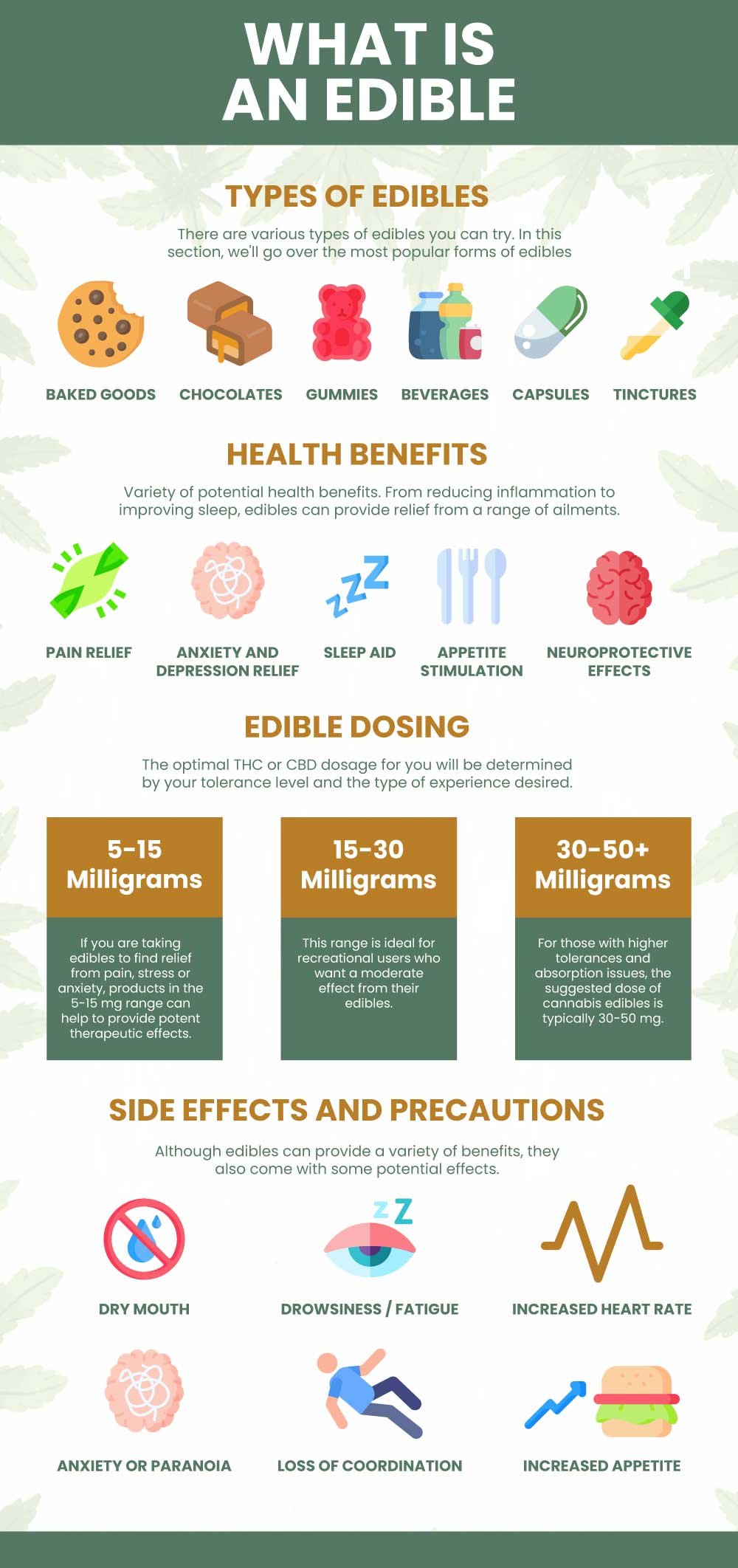What is an Edible - A Comprehensive Guide
What is an edible? You might be asking yourself this question as more and more states legalize cannabis consumption in the United States. Edibles are a unique and popular way to enjoy the benefits of cannabis. Whether you're looking for a discrete option, an extended-release experience, or just something delicious to eat, edibles offer an exciting way to consume cannabis.
This comprehensive guide will address all aspects of marijuana edibles: from how they work to how you can find the most enjoyable product for you. We'll also cover what to look for when purchasing and consuming edibles, as well as some of the potential risks associated with this method of cannabis consumption. By the time you're done, you'll have a better understanding of why marijuana edibles are becoming increasingly popular and how they can fit into your lifestyle.
Defining Edibles - edibles meaning
So, what is an edible? An edible, also known as a cannabis-infused food product or beverage, is a product that contains cannabinoids like THC and CBD. These compounds interact with the body's endocannabinoid system to produce effects such as increased relaxation and euphoria. These edible cannabis products can come in many forms, including baked goods, chocolates, gummies, and even beverages. Because edibles are digested, their effects typically last longer than other forms of cannabis consumption.
Types of Edibles
As stated earlier, there are various types of edibles you can try. In this section, we'll go over the most popular forms of marijuana edibles and what they can offer:
Baked Goods: Baked goods like brownies, cookies, and cakes are some of the most common types of edibles. They often contain high levels of THC or CBD and deliver a potent dose in a single serving. Baked goods are great for those who have a sweet tooth, too.
Chocolates: Who doesn't love chocolates? Edible chocolate bars come in a variety of flavors and concentrations of THC or CBD. And because they're chocolate, they can be an easy and delicious way to consume cannabis.
Cannabis gummies: Looking for a chewy, fruity snack? Weed gummies are a great option. Like chocolates, they come in various concentrations and flavors. They can also be a discreet way to consume cannabis since they look like regular gummy bears.
Beverages: Have you ever heard of cannabis-infused teas and sodas? These beverages offer a discreet and tasty way to ingest THC or CBD. They usually come in small, single-serving sizes, so they can be a convenient option for on-the-go consumption.
Capsules: For those who prefer a more precise dose, capsules are an excellent choice. They contain a preset amount of THC or CBD that is easy to measure and consume.
Tinctures: Finally, tinctures are one of the most popular forms of edibles. They are concentrated liquid extracts that can be added to food or drinks for a subtle and discreet cannabis experience.
Health Benefits of Edibles
Cannabis edibles offer a variety of potential health benefits. From reducing inflammation to improving sleep, edibles can provide relief from a range of ailments. Here are some of the potential health benefits of edibles:
Pain Relief
Pain is caused by inflammation, and edibles can help reduce inflammation in the body. Cannabinoids like THC and CBD have anti-inflammatory properties that can help reduce pain from chronic conditions like arthritis and fibromyalgia.
Anxiety and depression relief
Edibles can also help improve mental health. THC and CBD interact with the body's endocannabinoid system, which helps regulate mood and emotions. This can help reduce symptoms of anxiety and depression, as well as improve overall mental health.
Sleep Aid
A lot of people struggle to get a good night's rest. Insomnia, sleep apnea, and other sleep-related conditions can make it hard to get the rest you need. Edibles can help promote relaxation and improve sleep quality.
Appetite Stimulation
A Lack of appetite can be caused by various medical conditions and can negatively affect the body's ability to absorb nutrients. Edibles like cannabis-infused brownies can help stimulate appetite, which can help ensure the body is getting the proper nutrition it needs.
Neuroprotective Effects
THC and CBD may also be neuroprotective, meaning they can help protect the brain from damage caused by free radicals. This could potentially reduce the risk of neurodegenerative diseases like Alzheimer's and Parkinson's.
EATING EDIBLES: DOSAGE + TIMEFRAMES
Edibles, infused with the active ingredient in marijuana, tetrahydrocannabinol (THC), offer a unique and distinct set of effects compared to other consumption methods. When ingested, THC undergoes a metabolization process in the liver, resulting in a delayed onset of effects, typically taking 30 minutes to 2 hours to fully manifest.
This extended timeframe allows for a more gradual and long-lasting high as THC is absorbed into the bloodstream, delivering potent and sustained relief from various conditions, such as pain, anxiety, or insomnia. The effects of edibles are renowned for their body-centric and often deeply relaxing nature, making them an appealing option for those seeking a more prolonged and therapeutic cannabis experience.
To ensure a safe and delightful experience, it is vital to properly dose edibles. The optimal THC or CBD dosage for you will be determined by your tolerance level and the type of experience desired. Here are some common edible doses on the market, as well as how they typically affect someone with low tolerance:
5-15 Milligrams: If you are taking edibles to find relief from pain, stress or anxiety, products in the 5-15 mg range can help to provide potent therapeutic effects. This isn't as strong as a recreational dose, but it's more powerful than a mild one.
15-30 Milligrams: This range is ideal for recreational users who want a moderate effect from their edibles. This dose can provide a mild but enjoyable high that lasts for several hours.
30-50 Milligrams and Higher: For those with higher tolerances and absorption issues, the suggested dose of cannabis edibles is typically 30-50 mg. Bear in mind that first-time users may experience adverse effects such as anxiety or paranoia if they consume too much, and it's crucial to begin low and increase consumption gradually.
4 Steps To Follow When Taking Your First Edible
To prevent any adverse effects, it's important to take edibles responsibly. Here are four steps you should follow when taking your first edible:
Step 1- Start With 5 Milligrams of THC
Whether you're a long-time cannabis user or you're just now becoming involved in the cannabis community, your first time trying edibles should always begin with a low dosage. For most people, that means 5 mg of THC per serving.
Step 2- Wait for 1-2 Hours Before Taking More
When eating edibles, it's important to note that the effects can take anywhere from 30 minutes to two hours before they set in. To be safe, wait for at least an hour or two before deciding whether to take more.
Step 3- Monitor Your Effects
Before consuming a second serving of edibles, pay attention to how you're feeling. All edibles are different, as well as the effects they provide.
Step 4 - Take Note of Your Experience
It's also important to keep track of how much you consume, as well as how it makes you feel. This can help you determine how your body responds to edibles and the optimal dose for future use.
Side Effects and Precautions
Although edibles can provide a variety of benefits, they also come with some potential effects. Here is a list of some of the side effects of edibles to be aware of:
• Dry mouth
• Drowsiness/fatigue
• Increased heart rate
• Anxiety or paranoia
• Loss of coordination
• Increased appetite
There are a variety of factors that can cause you to experience negative effects. Below, we go into detail about a few of the most common ones.
Overconsumption
Overconsumption is one of the most common causes of adverse effects from edibles. It's important to start slow and increase your dose gradually to allow your body time to adjust.
Delayed Onset
Edibles can take a while before the effects are felt. Because of this, it's important to wait before taking more so you don't end up taking too much.
Dosing Difficulties
Another common issue is that many edibles don't provide accurate dosage information on the packaging. This often leads to confusion about how much THC or CBD should be taken and can easily result in overconsumption.
To avoid this, it's important to read the label carefully and look for products that provide accurate information about their THC or CBD content. Additionally, it's best to buy edibles from a reputable source to ensure you get an accurately labeled product.
Interaction with Other Medications
Edibles may also interact with certain medications, so it's important to speak to your doctor before taking them. Additionally, edibles should be avoided if you are pregnant or breastfeeding.
Edibles Vs. Smoking
Edibles vs. smoking? Which is better? The answer to this question depends on the person, as both methods have their own unique benefits. Smoking cannabis provides a more immediate effect, while edibles allow for a more sustained and longer-lasting experience. Smoking marijuana is also more of a social activity, while edibles can be consumed discreetly. Overall, the choice of which to use depends on personal preferences and desired effects.
Frequently Asked Questions
Are edibles drugs?
Are edibles drugs? Well, it depends on your definition of the word 'drug.' In general terms, a drug is any substance that has pharmacological effects on the body. In that sense, yes, edibles are drugs. However, they are not typically considered to be dangerous or addictive like many other types of drugs and are often used for medicinal purposes.
Are Edibles Illegal?
In the United States, the legality of edibles depends on the state you live in. In most states, cannabis products, including edibles, are legal for either recreational or medicinal use. It's important to research your state's laws before purchasing any edibles.
Are Edibles Addictive?
Edibles are not generally considered to be addictive, as they do not contain any of the substances usually associated with addiction. However, consuming too much can lead to feelings of nausea and anxiety, so it's important to be aware of your own tolerance level when consuming edibles.
How to Recover From Edibles?
If you find yourself feeling anxious or uncomfortable after taking pot edibles, the best thing to do is try to relax. Exercise and meditation are great ways to relax, as well as drinking plenty of water and eating a light meal. If the feeling persists, it may be best to contact your doctor or a healthcare professional.
Conclusion
In summary, understanding what is an edible and exploring the broader edibles meaning are crucial for anyone delving into the world of cannabis. Edibles can provide a variety of benefits, but it's important to be aware of their potential side effects and take precautions when using them. Be sure to start slow and wait until the effects are felt before taking more, and always read labels carefully for accurate dosage information. Additionally, if you are not sure if edibles are right for you, we recommend speaking with a doctor, especially if you are pregnant or on medication. By understanding how edibles work and the differences between them and smoking cannabis, you can get the most out of your experience.
Looking For High-Quality Weed In DC?
Explore the finest cannabis selections at no kids allowed—your go-to source in DC for top-tier strains and marijuana products. Stop by our DC dispensary store (only a few minutes from Capitol Hill) or browse our collection online. Connect with us at (202) 897-5993 for expert advice on our premium offerings. For exclusive updates and special deals, follow us on Instagram @nka.dc






